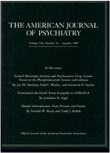ECT and memory: brief pulse versus sine wave
Abstract
The authors evaluated the effects on memory of ECT given with either unilateral or bilateral electrode placement and with brief-pulse or sine-wave stimulus waveform. Clinical criteria determined the mode of ECT and the treatment parameters. As expected, right unilateral ECT produced less memory impairment than bilateral ECT. Brief-pulse ECT resulted in less memory impairment than sine-wave ECT during the first hour after treatment but had similar effects on memory after the first hour. Brief-pulse ECT might produce less memory impairment than conventional sine-wave ECT; however, this can probably be achieved in clinical practice only if treatment parameters that keep stimulation close to the seizure threshold are developed individually for each patient.
Access content
To read the fulltext, please use one of the options below to sign in or purchase access.- Personal login
- Institutional Login
- Sign in via OpenAthens
- Register for access
-
Please login/register if you wish to pair your device and check access availability.
Not a subscriber?
PsychiatryOnline subscription options offer access to the DSM-5 library, books, journals, CME, and patient resources. This all-in-one virtual library provides psychiatrists and mental health professionals with key resources for diagnosis, treatment, research, and professional development.
Need more help? PsychiatryOnline Customer Service may be reached by emailing [email protected] or by calling 800-368-5777 (in the U.S.) or 703-907-7322 (outside the U.S.).



